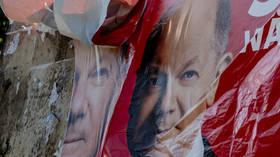0% of Germans ‘very satisfied’ with government – poll
Over 81% of German voters have expressed dissatisfaction with the government’s work
Not a single German national appears to be fully satisfied with their government, the latest ARD-DeutschlandTREND survey has revealed.
The country is currently governed by the so-called traffic light coalition, which consists of Chancellor Olaf Scholz’s center-left Social Democrats (SPD), the Free Democrats (FDP), and the Greens.
According to the survey, conducted on July 1-3, zero percent of Germans said they were “fully satisfied” with the ruling coalition’s work, with just 19% saying they were somewhat “satisfied.”
The overall dissatisfaction rate with the government’s policies rose to 81%, with 38% saying they were “not satisfied at all.”
Half of the surveyed SPD and Green voters admitted they are now less than satisfied with the government’s performance. The figure is even more striking among other parties’ supporters, with just 17% of Free Democratic Party (FDP) voters and 11% of Christian Democratic Union (CDU) and Christian Social Union (CSU) supporters saying they somewhat approve of the government’s work.
Some 96% of voters who back the new left-wing BSW party, formed by former Left Party leader Sahra Wagenknecht earlier this year, said they were dissatisfied with the traffic light coalition, while none of the right-wing Alternative for Germany (AfD) party supporters said they were happy with the government’s work.
During the EU parliamentary elections last month, Scholz’s center-left coalition suffered a defeat, coming third after the conservatives and the AfD, which led to the opposition demanding a vote of no confidence in the government or snap elections. The SPD party won just 14% of the vote, the worst result in decades.
Scholz attributed his party’s poor showing to voters’ disagreement with military support for Ukraine and sanctions against Russia, but claimed that “there is no alternative to changing that.”
Prior to the Russia-Ukraine conflict, Germany was one of the biggest consumers of relatively inexpensive Russian natural gas, which greatly benefited the country’s prized industrial sector. After the EU push to eliminate Russian energy imports as part of the sanctions, the German economy has taken several major hits, with many energy-intensive businesses either leaving the country or shutting down entirely.






Comments are closed.